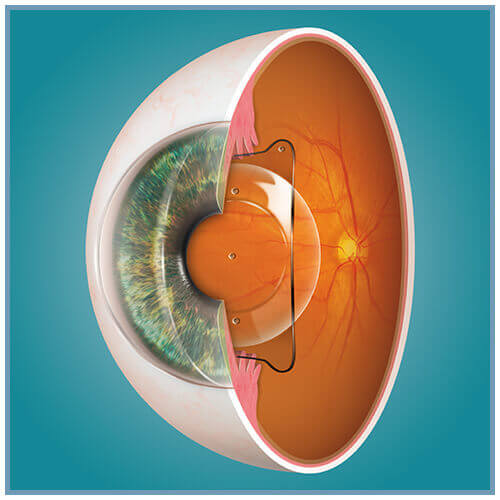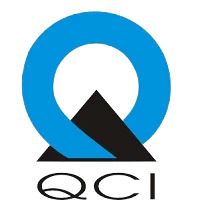IPCL
What is IPCL?
Implantable Phakic Intraocular Lenses (IPCL) are innovative medical devices used in ophthalmology to correct vision problems, particularly in individuals with high refractive errors like myopia (nearsightedness), hyperopia (farsightedness), or astigmatism. Unlike traditional contact lenses or glasses, IPCLs are surgically implanted inside the eye, typically in front of or behind the natural lens but still allowing it to remain intact (phakic).
IPCLs work by altering the way light enters the eye, thus focusing it correctly on the retina, leading to improved vision without altering the natural anatomy of the eye. This technology is especially beneficial for those who are not suitable candidates for procedures like LASIK or have extreme refractive errors. IPCLs offer the advantages of long-lasting vision correction, reduced dependence on glasses or contacts, and a lower risk of complications compared to other surgical options. However, the procedure carries some risks and requires careful patient selection and post-operative monitoring by an experienced ophthalmologist.
Book Free Consultation
Book Appointment or Video Consultation online with top eye doctors
Types of IPCL
Implantable Phakic Intraocular Lenses (IPCLs) come in various types to address different vision correction needs and eye characteristics. Some of the common types of IPCLs include:
- Phakic Anterior Chamber Lens (PACL): It is suitable for individuals with moderate to high myopia and provides effective vision correction.
- Phakic Iris-Fixated Lens (PIFL): PIFLs are fixed to the iris, the colored part of the eye, and are often used for individuals with moderate to high myopia or hyperopia.
- Phakic Posterior Chamber Lens (PPCL): PPCLs are designed for individuals with a wide range of refractive errors, including myopia, hyperopia, and astigmatism.
- Toric IPCLs: Toric IPCLs are specially designed for individuals with astigmatism. They have a toric shape to correct both astigmatism and other refractive errors.
- Multifocal IPCLs: They are often used for presbyopia, a condition that affects near vision with age.
- Phakic Refractive Lens Exchange (PRLE): PRLE involves replacing the natural lens with a customized IPCL to correct vision, particularly in individuals with cataracts and refractive errors.


About the Manufacturer
The manufacturing of Implantable Phakic Intraocular Lenses (IPCLs) involves several companies worldwide, each specializing in different IPCL types. Prominent manufacturers include Alcon, a subsidiary of Novartis, which produces the AcrySof Phakic IOL for various vision correction needs.
Additionally, STAAR Surgical manufactures the Visian ICL, a well-known IPCL brand that offers a range of options, including toric and multifocal lenses. Zeiss, renowned for its optical technology, also produces the AT LISA Tri, a multifocal IPCL.
These manufacturers adhere to strict quality standards and collaborate with ophthalmologists to develop and refine IPCL designs, ensuring the safety and efficacy of these implantable lenses for vision correction worldwide.
Advantages of IPCL
Implantable Phakic Intraocular Lenses (IPCLs) offer several advantages for vision correction compared to other methods such as glasses or contact lenses:
- High-Quality Vision: IPCLs can provide high-quality, crisp vision correction. They are particularly effective for individuals with high refractive errors.
- Stable Correction: IPCLs provide a stable and permanent vision correction solution. Once implanted, they remain in place and do not require daily maintenance or replacement like contact lenses.
- Preservation of Natural Lens: Unlike some other intraocular lens procedures, IPCLs are phakic, meaning they leave the natural lens intact.
- Suitable for Candidates Unsuitable for Other Procedures: IPCLs are suitable for individuals who may not be good candidates for other refractive surgeries like LASIK, such as those with thin corneas or extreme refractive errors.
- Enhanced Quality of Life: Improved vision through IPCLs can lead to an enhanced quality of life, boosting self-confidence and reducing the impact of vision problems on daily activities.

ICL Eye Surgery Cost
The cost of ICL (Implantable Collamer Lens) surgery typically ranges from ₹50,000 to ₹80,000 per eye. Prices may vary based on the specific location, the surgeon’s experience, and the type of ICL used. Overall, ICL surgery is often more affordable in India compared to many other countries.
| Procedure | Price/Eye (₹) | Lens / Procedure Type |
|---|---|---|
| LASIK | 30,000 | C-Lasik / PRK |
| Basic ICL Surgery | 35,000 | Indian Lens |
| IPCL / Biotech Lens Surgery | 50,000 | Toric Lens |
| IPCL / Biotech Lens Surgery | 60,000 | Non-Toric Lens |
| EVO Staar Visian ICL Lens Surgery | 65,000 | Toric Lens |
| EVO Staar Visian ICL Lens Surgery | 75,000 | Non-Toric Lens |
Best Hospital
India is home to several renowned eye hospitals, including institutions like the L.V. Prasad Eye Institute, Sankara Nethralaya, AIIMS, and Eye Mantra, all of which offer ICL surgery services. Eye Mantra, in particular, is well-equipped with state-of-the-art technology and advanced equipment to provide a comprehensive range of eye care services. This includes procedures such as LASIK, SMILE, Contura, and ICL, all of which are offered at affordable rates. Our primary objective is to enhance the vision and overall quality of life for our valued patients.
If you are contemplating IPCL eye surgery, we strongly encourage you to arrange an appointment with our team of experts. This initial consultation will enable our specialists to evaluate your unique eye condition and recommend the most suitable treatment tailored to your specific needs. We are fully dedicated to assisting you in achieving clearer vision and better overall eye health.





Frequently Asked Questions
Typically, IPCLs can correct refractive errors ranging from approximately -3.00 to -20.00 diopters (D) for myopia and up to +10.00 D for hyperopia, with variations depending on the specific IPCL type and manufacturer.
The delivery time for Implantable Phakic Intraocular Lenses (IPCLs) can vary depending on factors such as the specific type of IPCL, the manufacturer, and the availability of the lenses. Generally, it may take several weeks to a few months from the time of consultation with an ophthalmologist to the actual surgical implantation of the IPCLs.
Implantable Phakic Intraocular Lenses (IPCLs) differ from other lenses in that they offer permanent vision correction, eliminate the need for glasses or contacts, and can correct a wide range of refractive errors. In contrast, contact lenses are temporary and require daily care, while intraocular lenses (IOLs) are primarily used for cataracts and replace the natural lens. IPCLs provide long-term, stable vision correction with a broader range of applications.
Implantable Phakic Intraocular Lenses (IPCLs) are generally considered safe when performed by skilled ophthalmic surgeons. However, risks and suitability should be assessed on an individual basis through consultation with an eye specialist.
Whether Implantable Phakic Intraocular Lenses (IPCLs) are covered by insurance can vary depending on your insurance provider, your specific policy, and the reason for the procedure. Some insurance plans may cover IPCL surgery for medical reasons, such as severe vision impairment, while others may consider it elective and not covered.


